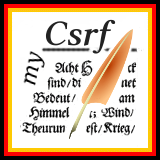myCrsf
 mind your Classical Scholar Research Framework is a LaTeX / BibTeX / JabRef based collection of readily configured files for managing the whole process of writing a research paper in humanities – including searching and evaluating the secondary literature, maintaining the bibliographical data, generating abstracts and extracts and writing the final work. But all these steps shall follow the rules of the classical scholar research process and writing style.
mind your Classical Scholar Research Framework is a LaTeX / BibTeX / JabRef based collection of readily configured files for managing the whole process of writing a research paper in humanities – including searching and evaluating the secondary literature, maintaining the bibliographical data, generating abstracts and extracts and writing the final work. But all these steps shall follow the rules of the classical scholar research process and writing style.
Initially, I needed a little old-fashioned presentation style for writing some scientific psikeds documents. But while elaborating that framework, it get more an more it’s own life. So, at the end it was time to give the software it’s individual name, license and open Github repository.
License
Unless otherwise stated, the mycsrf files are licensed under the Creative Commons Attribution 3.0 Germany License (http://creativecommons.org/licenses/by/3.0/de/): Feel free to share (to copy, distribute and transmit) or to remix (to adapt) it, if you respect how you must attribute the work in the manner specified by the author:
In case of creating a PDF on the base of mycrsf insert the following line on the front page: Format derived from ‘mind your Scholar Research Framework’ (c) K. Reincke CC BY 3.0 DE http://mycsrf.fodina.de/
In an internet based reuse please link the reused parts to https://2022.fodina.demycrsf and mention the original author Karsten Reincke in a suitable manner.
Some of the examples are licensed under the Creative Commons Share Alike 3.0 Germany License (CC BY-SA 3.0 DE) (https://creativecommons.org/licenses/by-sa/3.0/de/): Feel free to share (to copy, distribute and transmit) or to remix (to adapt) it, if you a) distribute these examples under the same conditions and if you b) respect how you must attribute the work in the manner specified by the author (see above)

